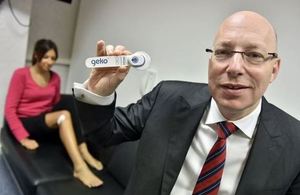Success story: Olympic device leads to blood clot prevention
NHS embraces Sky Medical's novel medical device to prevent deep vein thrombosis in hip transplant patients.

Bernard Ross, CEO of Sky Medical, holding up to camera a Geko medical device. Female patient in the background.
Strapping a device the size of a wristwatch to the back of the knee helped some British athletes improve their performances at the London Olympics.
Now the technology is being enlisted to help prevent blood clots after hip surgery and a range of medical conditions.
OnPulse is based on a simple observation: stimulating the common peroneal nerve behind the knee causes the calf muscle to contract. This increases blood flow to the heart and that can have a number of benefits.
Bernard Ross, chief executive officer of Sky Medical Technology, set up the company in 2008 to commercialise the OnPulse technology. It was the result of a 3-year programme of research at St Bartholomew’s Hospital in London looking to find a better way to prevent deep vein thrombosis (DVT). Bernard said:
Now we‘re at the stage where we have approval from the National Institute for Health and Care Excellence (NICE) and the US Food and Drug Administration (FDA) and it is being used by elite athletes.
Grant support from Innovate UK has been instrumental in the growth of our company.
Neuromuscular stimulation
Sky Medical was first approached by UK Sport about using its technology to help members of the Olympics team recover more quickly, but as a small company it did not have the resources.
An £80,000 grant from Innovate UK enabled Sky Medical to prove its concept of a novel type of neuromuscular stimulation, partnering with Loughborough University to run multi-centre clinical trials on the device.
Valuable data helped to generate sales for Firefly, a version for sports applications. Its major customers include: AC Milan, Chelsea, West Ham, Everton football teams and the NFL’s San Francisco 49ers.
In 2013 Sky Medical teamed up with Innovate UK again for 15-month, £130,000 feasibility study to test the technology on soft tissue swelling.
The company was still keen to use the device – branded geko for medical applications – for its original purpose. Innovate UK granted £870,000 for a two-year, collaborative R&D project to test it as a means of preventing DVT after hip replacements.
The results were even better than hoped. NICE has advised the NHS to use geko devices on patients where compression devices are impractical and contra-indicated.
Getting Innovate UK funding for these trials meant that revenue from Sky Medical’s innovation was not lost to an overseas intellectual property deal. It also gave private investors confidence to stay with the company.
Bernard hopes this will allow them to build a £400 million company over the next five years through direct sales and licensing agreements. “We’ve got offers from 180 distributors around the world,” he said.
Sky Medical now has 25 full-time employees and Innovate UK continues to play an essential role. £250,000 Smart development-of-prototype funding is helping to develop a new device for treating hard-to-heal leg wounds.
All this will have broader benefits, according to Bernard:
Innovate UK is enabling UK companies to fund medical technology that will ultimately lead to massive patient benefit. If we are able to do that in the UK we can transfer it to other markets as well.
Find out more about Innovate UK funding awards and see our latest funding competitions
Updates to this page
-
First published.